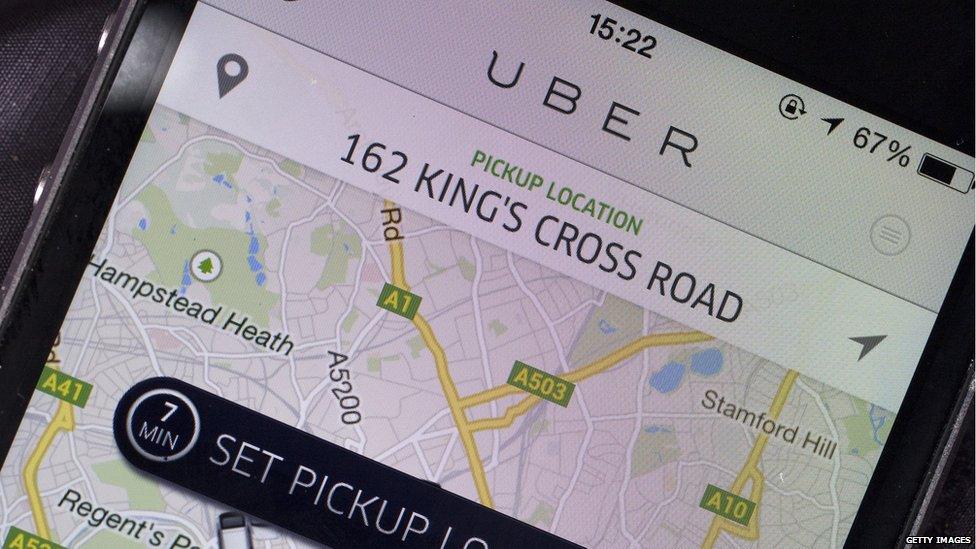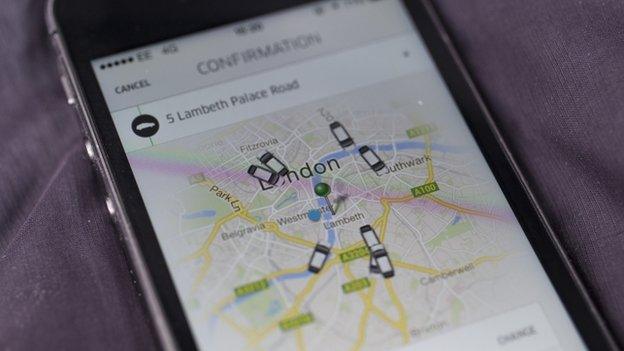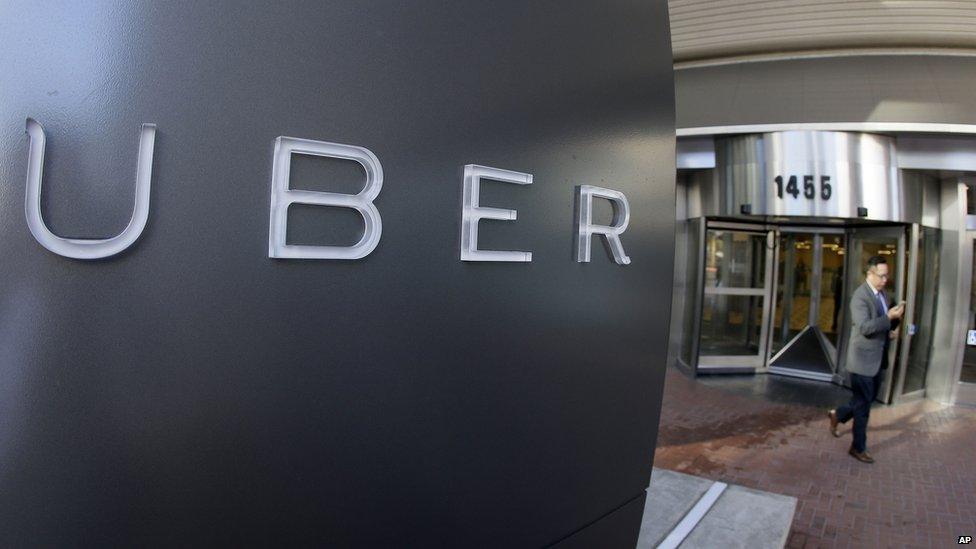Uber drivers consider legal action
- Published

Uber says it "seamlessly connects riders to drivers"
More than 100 drivers for app-based taxi company Uber are looking to take action over their rights, lawyers have told the Victoria Derbyshire programme.
The legal action is aiming to establish the drivers with worker status, rather than as self-employed customers or partners - which is how Uber sees them.
The first four cases were lodged last week, arguing the company is breaching its duty on basic rights.
Uber says most of its drivers want the flexibility its approach offers.
Drivers pay a fee to use the Uber technology. When a job comes up the nearest driver is offered it, otherwise it goes to the next person. For this, Uber takes a fee of 20%, soon to rise to 25% for new drivers.
Employment lawyer Nigel Mackay, who is representing the drivers, said Uber was not complying with employment law.

Find out more
Watch Jim Reed's film about Uber here.

"What we want to do is try and ensure these drivers get workers' rights, the rights that anyone who works is entitled to. Things like minimum wage, the right to paid holiday," he said.
He added that the ways in which Uber controlled its drivers - including the provision of initial training, guides as to which routes to take and requirements for minimum hours - meant they were not just self-employed.
Mr Mackay said there were also serious health and safety issues as currently Uber did not ensure its drivers take rest breaks or work a maximum number of hours per week.
"A lot of these workers work 50, 60, 70 hours per week - they should be entitled to paid time off for doing that work," he said.
"I think it's true that there's a real risk to health and safety if drivers are being pushed by circumstance to drive these long hours - because they are not sitting in an office, it is a potentially dangerous job."

James's experience
James Farrar has worked for Uber since last December.
"I joined because I was working on a start-up so I needed the flexibility to work when I wanted, while having the remainder free for research and writing. The flexibility with Uber is really great.
"The only problem is that when you're not working you're not earning and your earnings are so much lower than I expected. It's really starting to bite now.
"It's more difficult to make money than six months ago. There's a certain amount of money [I want to be earning] each day and I just need to stay out longer and longer to earn it.
"My average pay in July was £5.03 an hour, well below the minimum wage. So if you want to cover your costs and keep the family afloat, you've got to work a lot of hours.
"I wouldn't want to be picked up myself by somebody who has worked 18 hours a day. Since we are self-employed, Uber does not take responsibility for that occupational risk.
"I could get another job, but Uber has so aggressively come into the market, the chances of working for other operators are rapidly evaporating."

GMB, the union that represents professional drivers, has instructed Leigh Day to take the action on behalf of its members driving for Uber.
The first cases were submitted to the London Central Employment Tribunal. The law firm says it will be submitting further claims and will be asking the tribunal to hear them all together.
Uber describes itself as a "fully licenced" service that connects potential passengers with a background-checked private driver and takes a cut - typically 20% - of the fee.
It currently operates in 10 cities in the UK. It had 7,000 drivers in London in 2014, a number which has risen to 20,000 this year.
Flexibility
Uber says the drivers are self-employed not workers and therefore and therefore they do not have to guarantee them a minimum wage.
Uber's regional general manager, Jo Bertram, said most of its drivers had moved from traditional jobs with prescribed shifts as they wanted the flexibility Uber's approach offered.
"The fact you can work literally whenever you want, spend time with kids, you can build business on the side. That's the flexibility the majority of Uber drivers are looking for," she said.
She added the company looked at how much money the drivers took home very carefully.
"What we find is drivers using the app actually take home around £15 or £16 an hour. Obviously their costs vary hugely depending on whether they rent or own and a number of other factors, but the majority are actually making around £10/12 per hour even after costs."
The Victoria Derbyshire programme is broadcast on weekdays between 09:15 and 11:00 on BBC Two and the BBC News Channel.
- Published5 September 2015
- Published29 July 2015

- Published9 July 2015
